
Medical Science Educator
Scope & Guideline
Pioneering research for the next generation of medical educators.
Introduction
Aims and Scopes
- Innovative Teaching Strategies:
The journal emphasizes the exploration and implementation of innovative teaching methodologies such as problem-based learning, simulation, and peer-assisted learning to improve medical education outcomes. - Curriculum Development and Evaluation:
A core focus is on the design, implementation, and evaluation of medical curricula that effectively address the evolving needs of healthcare education and training. - Integration of Technology in Education:
It highlights the use of technology, including online learning platforms, virtual reality, and artificial intelligence, to enhance teaching and learning experiences in medical education. - Assessment and Feedback Mechanisms:
The journal covers various assessment strategies, including formative and summative assessments, and the importance of feedback in promoting student learning and professional development. - Diversity, Equity, and Inclusion in Medical Education:
It addresses the necessity of creating inclusive educational environments and curricula that reflect diverse populations and promote equity in healthcare education. - Research and Scholarship in Medical Education:
The journal encourages research that contributes to the understanding of educational practices, student engagement, and outcomes, thereby fostering a culture of scholarship among educators.
Trending and Emerging
- Use of Artificial Intelligence in Education:
The incorporation of AI tools and applications, such as ChatGPT and AI-driven assessments, is becoming increasingly prominent, reflecting the need for educators to adapt to technological advancements in education. - Mental Health and Wellness in Medical Education:
There is a growing recognition of the importance of mental health and wellness among medical students, leading to an increase in research focused on student well-being and the impact of educational stress. - Interprofessional Education and Collaboration:
Emerging studies emphasize the significance of interprofessional education, promoting collaboration among various healthcare disciplines to enhance patient care and improve educational outcomes. - Culturally Responsive Education:
Research focusing on culturally responsive teaching and addressing health disparities in medical education is gaining traction, highlighting the need for a more inclusive curriculum. - Innovative Assessment Practices:
There is a trend towards exploring innovative assessment practices that go beyond traditional testing methods, focusing on authentic assessments and formative feedback to enhance learning.
Declining or Waning
- Traditional Lecture-Based Teaching:
There is a noticeable decrease in papers emphasizing traditional lecture-based teaching methods, as the focus shifts toward more interactive and student-centered approaches to learning. - Standalone Basic Science Education:
The integration of basic sciences with clinical education is becoming more prevalent, leading to a decline in studies that treat basic science education as a separate entity. - Focus on Individual Assessment Methods:
Research concentrating solely on individual assessment methods, such as multiple-choice questions, is waning as there is a growing interest in comprehensive assessment systems that evaluate multiple competencies. - Non-Interactive Online Learning:
As medical education adapts to new technologies, there is a decline in interest in non-interactive online learning formats, favoring more engaging and interactive online educational experiences. - Generic Professionalism Training:
The focus on generic professionalism training is decreasing, with more emphasis being placed on specific, context-driven approaches to teaching professionalism in medical education.
Similar Journals
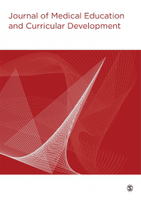
Journal of Medical Education and Curricular Development
Transforming Medical Education for Tomorrow's HealersJournal of Medical Education and Curricular Development is a pioneering open-access journal published by SAGE Publications Ltd, dedicated to advancing the field of medical education. With an ISSN of 2382-1205, this journal has been committed to providing high-quality, peer-reviewed research since 2014. It serves as a vital platform for educators, researchers, and practitioners interested in innovative teaching methodologies, curriculum development, and assessment strategies in medical education. The journal not only aims to disseminate impactful research but also encourages scholarly dialogue on best practices and emerging trends in the field. By offering unrestricted access to published articles, it ensures that knowledge is widely accessible, promoting collaboration and improvement in medical training worldwide. As a key resource for professionals and academics alike, it supports the ongoing evolution of educational practices that directly influence healthcare outcomes.
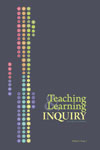
Teaching & Learning Inquiry-The ISSOTL Journal
Fostering scholarly dialogue for impactful teaching.Teaching & Learning Inquiry-The ISSOTL Journal, published by UNIV CALGARY PRESS, is a premier open access journal dedicated to enhancing educational practices and fostering scholarly discourse in the field of teaching and learning. With an ISSN of 2167-4779 and E-ISSN 2167-4787, this journal has been at the forefront of educational research since its inception in 2013, operating within a converged timeframe until 2024. Recognized with a Q2 ranking in Education and classified within the 55th percentile of Scopus’ rankings for education-focused social sciences, the journal aims to disseminate original research, theoretical inquiries, and practical applications that contribute to the scholarship of teaching and learning (SoTL). As an open access publication since 2016, it ensures that vital research is widely accessible, making it a critical resource for researchers, educators, and students seeking to advance their understanding and practice in the dynamic landscape of education. Based in Calgary, Canada, the journal continues to engage with innovative perspectives that shape and define the educational experience, making it an essential read for anyone invested in the future of teaching and learning.
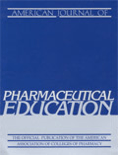
AMERICAN JOURNAL OF PHARMACEUTICAL EDUCATION
Empowering the Future of Pharmacy Through KnowledgeThe American Journal of Pharmaceutical Education (ISSN: 0002-9459; E-ISSN: 1553-6467), published by Elsevier, stands as a premier platform in the intersecting fields of pharmacy and education. Established as a vital resource since 1945 and converging through several pivotal periods, this journal has consistently garnered attention for its rigorous selection of research and insight, earning a distinguished ranking in the top quartiles in 2023 across multiple categories, including Q1 in Education, Q1 in Medicine, Q1 in Pharmacology, and Q1 in Pharmacy. Its impact within the academic community is evident, with impressive Scopus rankings placing it among the top in its field (4th out of 45 in Health Professions - Pharmacy). The journal's commitment to advancing pharmaceutical education plays a crucial role in shaping future professionals equipped with the latest knowledge and practices. Although it currently does not offer Open Access options, its rigorous peer-review process and high-impact content ensure visibility and engagement among researchers, educators, and students alike, making it an indispensable resource for those invested in pharmaceutical sciences.
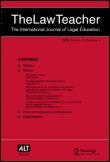
Law Teacher
Empowering Legal Educators for Tomorrow's ChallengesLaw Teacher is a premier academic journal dedicated to the field of legal education, published by Routledge Journals, Taylor & Francis Ltd. With an ISSN of 0306-9400 and an E-ISSN of 1943-0353, the journal has been a leading platform since its inception in 1967, exploring innovative approaches and pedagogical strategies in law teaching. Recognized for its impact, it currently holds a Q3 ranking in Law and Q4 in Education as of 2023, reflecting its significance within these fields. The journal not only serves as a repository for cutting-edge research but also engages educators, researchers, and practitioners, fostering dialogue and collaboration among stakeholders in legal education. Operating from the United Kingdom, Law Teacher is committed to enhancing the quality of legal training and scholarship, ensuring its relevance to contemporary issues in law and legal practice.

Pegem Egitim ve Ogretim Dergisi
Connecting Ideas to Transform Educational LandscapesPegem Egitim ve Ogretim Dergisi is a prominent academic journal published by PEGEM AKAD YAYINCILIK EGITIM DANISMANLIK HIZMETLERI TIC LTD STI, specializing in the field of education. Based in Turkey, this journal offers a platform for scholarly discourse, catering to both emerging and established researchers in the educational domain. With its ISSN 2148-239X, the journal aims to provide insights into contemporary educational practices, pedagogical innovations, and research findings that influence teaching and learning. Although classified in the Q4 quartile of the education category as of 2022 and achieving a Scopus rank of 1178 out of 1469, it remains a valuable resource for practitioners and academics alike. The journal ceased Scopus coverage in 2023, yet it continues to be a relevant outlet for educational research in Turkey and beyond. While it operates under traditional access models, the potential for collaborative research and knowledge sharing makes it a noteworthy choice for those engaged in the evolving landscape of education.
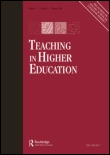
TEACHING IN HIGHER EDUCATION
Exploring transformative practices in university teaching.TEACHING IN HIGHER EDUCATION is a premier academic journal published by Routledge Journals, Taylor & Francis Ltd, dedicated to advancing the scholarship and practice of teaching within the higher education sector. With an ISSN of 1356-2517 and an E-ISSN of 1470-1294, this journal is widely recognized for its profound impact in the field, boasting a 2023 category rank of Q1 in Education, placing it in the top tier of educational research. Its commitment to fostering an inclusive and dynamic discourse on pedagogical methods and learning frameworks makes it essential reading for researchers, educators, and policymakers alike. Spanning topics such as student engagement, curriculum development, and innovative teaching strategies, TEACHING IN HIGHER EDUCATION aims to contribute to ongoing conversations and practical applications that enhance the educational landscape. While an Open Access option is not available, the journal maintains a robust readership, with its articles being rigorously peer-reviewed and disseminated to reflect cutting-edge research trends and practices in education.
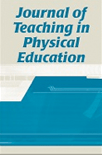
JOURNAL OF TEACHING IN PHYSICAL EDUCATION
Championing Health and Fitness in Education.JOURNAL OF TEACHING IN PHYSICAL EDUCATION, published by Human Kinetics Publishers Inc, stands as a premier academic journal committed to advancing knowledge and practice in the realms of physical education and related fields. With an impressive impact factor reflecting its relevance and influence in educational research, this journal boasts a distinguished classification as a Q1 journal in Education and Physical Therapy fields for 2023. Spanning from 1996 to 2024, it offers insightful contributions that engage educators, researchers, and students alike, addressing the evolving landscape of teaching methodologies and their implications for student health and fitness. The journal is accessible via traditional subscription models, providing a platform for innovative studies that aim to enhance teaching effectiveness and athletic performance. With a firm focus on interdisciplinary approaches, it plays a pivotal role in shaping future curricula in physical education and sports medicine.
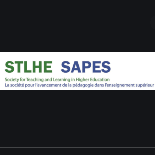
Canadian Journal for the Scholarship of Teaching and Learning
Advancing Excellence in Higher Education PedagogyThe Canadian Journal for the Scholarship of Teaching and Learning (CJSoTL) is a premier open-access journal dedicated to advancing research and discourse in the field of teaching and learning within higher education. Published by SOC TEACHING & LEARNING HIGHER EDUCATION, CJSoTL serves as a vital resource for educators, researchers, and students alike, promoting evidence-based practices and scholarship in higher education pedagogy. Since its inception in 2010, the journal has provided an inclusive platform for innovative research, case studies, and pedagogical strategies that enhance teaching effectiveness and student learning outcomes. Although specific metrics such as H-index and Scopus ranks are currently unlisted, the journal is committed to fostering a community of practice among scholars dedicated to improving teaching and learning environments. With its open-access policy, CJSoTL ensures that valuable knowledge is freely available, aligning with contemporary trends in academic dissemination and accessibility, thus making significant contributions to the scholarship of teaching and learning in Canada and beyond.

Informatics in Education
Bridging Technology and Pedagogy for Tomorrow's EducatorsInformatics in Education is a premier academic journal published by Vilnius University, Institute of Mathematics and Informatics, focusing on the intersection of information technology and pedagogical innovation. With an ISSN of 1648-5831 and an E-ISSN of 2335-8971, this Open Access journal has been disseminating critical research since 2003, enabling widespread accessibility and collaboration across the global educational community. The journal's commitment to advancing the field is demonstrated by its impressive 2023 Category Quartiles: Q1 in Communication and Education and Q2 in Computer Science Applications, highlighting its significant impact on these disciplines. Located in Lithuania, Informatics in Education ranks impressively in Scopus, with a Social Sciences Communication rank of #54/511 (89th percentile) and a Social Sciences Education rank of #188/1543 (87th percentile). The journal's goals include fostering research that informs pedagogical practices and enhances educational outcomes through the innovative use of technology, ensuring it remains at the forefront of research in this vital field. Researchers, professionals, and students alike will find a wealth of knowledge within its pages to support their work and learning endeavors.
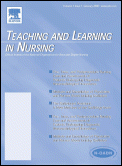
Teaching and Learning in Nursing
Transforming Theory into Practice in NursingTeaching and Learning in Nursing, an esteemed publication from ELSEVIER SCIENCE INC, serves as a cornerstone for advancing nursing education and practice. With its ISSN 1557-3087 and E-ISSN 1557-2013, this journal offers a platform for the dissemination of innovative research and best practices in nursing. It is recognized for its significant contributions within the categories of Fundamentals and Skills, Leadership and Management, and Research and Theory, consistently ranking within the top quartile in these essential areas for 2023. The journal's strategic focus on enhancing nursing pedagogy makes it an invaluable resource for researchers, educators, and practitioners alike, striving to bridge the gap between theory and application. Although it currently does not offer Open Access, its robust impact factor and critical insights foster a dynamic dialogue within the nursing community, making it a must-read for anyone dedicated to the evolution of nursing education. With an engaging scope that covers the latest trends and challenges in nursing pedagogy, it aims to equip the next generation of nursing professionals with the tools necessary for excellence in patient care and professional leadership. Explore this journal to stay updated on cutting-edge practices and contribute to the collective knowledge in nursing education.